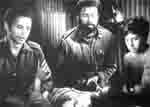 Several powerful films on the liberation war have been made in 44 years since Bangladesh won her freedom in 1971. The directors of some of these films have shared their challenges and gratification on making independence war-based films with New Age.
Several powerful films on the liberation war have been made in 44 years since Bangladesh won her freedom in 1971. The directors of some of these films have shared their challenges and gratification on making independence war-based films with New Age.
Noted director Chashi Nazrul Islam made Ora Egarojon, the first film on the war in 1972. Besides, Islam also made two other films –Shongram in 1974 and Hangor Nodi Grenade in 1995, on the war.
‘I was a freedom fighter and it is always a joy to deal with the sacrifices and glory of the war in my films,’ said Islam, who also mentioned that one needs to have honesty and dedication to history to portray it genuinely. ‘Many people have the idea that making a film on 1971 requires fighting scenes engaging explosions, tanks, machine guns and lots of soldiers; however, it is a wrong assumption,’ said Chashi, who added a war-based film can also deal with the psychological and social dilemma of the war victims rather than battlefield scenes.
Eminent director Tanvir Mokammel, who has made several films on the war including Nadir Naam Modhumoti, Rabeya and recently released Jibondhuli, supplemented Islam by stating that it is vital that one feels the struggle of 1971 in order to illustrate it on screen. However, Mokammel also admits that making such films is not quite an easy task. According to the director, there are two kinds of challenges—first, to recreate the past from 40 years ago and second, to portray the battle scenes trustworthily, in making such films.
Being critical of his own work, he stated, ‘In my first liberation war based film Nadir Nam Modhumoti, the action scenes do not look credible enough as we did not get any support from Bangladesh Army to portray scenes from battlefield realistically. But for our latest liberation war film Jibondhuli, we have received the support we required from the Bangladesh Army. So the massacre-scenes in the film look realistic.’ Chuknagar massacre, a genocide conducted by Pakistani invading army in Chuknagar, Khulna on May 20, has been depicted by Mokammel in his latest film Jibondhuli.
‘I shot the scenes at the actual location where the genocide took place. To portray the scene, I needed hundreds of people. However, the local people helped us a lot by enacting the role of the victims of the massacre. We even got hold of some people who really experienced and survived the massacre as well as people who have lost their relatives in that massacre. So the portrayal was realistic with their participation,’ shared Mokammel.
Mizanur Rahman Shamim, the director of 71 er Guerilla, also employed real life freedom fighters in the feature film, which released on December 13 in 2013. The film depicts the personal account of a freedom fighter named Mohammad Rafiqul Islam, who fought against the Pakistani army in Boardbazar, Gazipur area. Islam also acted in the film along with noted actor Sohel Rana, who is also a freedom fighter. ‘It was inspiring to work with the freedom fighters,’ said Shamim, who also told that as the freedom fighters had participated in the war, their acting in the film was credible and convincing.
However, Shamim experienced difficulties in terms of portrayal of the war as his film included some action scenes. ‘It is possible to create realistic explosion and action scenes in Bangladesh but the technology is still very costly. An independence war based film is much costlier to make than a general film as it is connected with battle scenes which are not easy to portray,’ observed Shamim.
UK-based Bangladeshi director Munsur Ali also faced numerous challenges as he didn’t wish to compromise in his making of 71 er Shongram, which will be released all over the country on March 28. ‘As I was born and brought up in the UK, the total film making process was a challenge for me. The language, location, casting everything were so difficult for me but I did not compromise with the demands of the film and eventually able to complete it,’ said Ali, who also informed that he brought all the equipment of film making from the UK to make 71 er Shongram a film of international standard.
However, like Chashi Nazrul Islam, Munsur Ali also believes that the challenges of making war based films could be overcome if there is determination and true commitment to the war.
-With New Age input




















